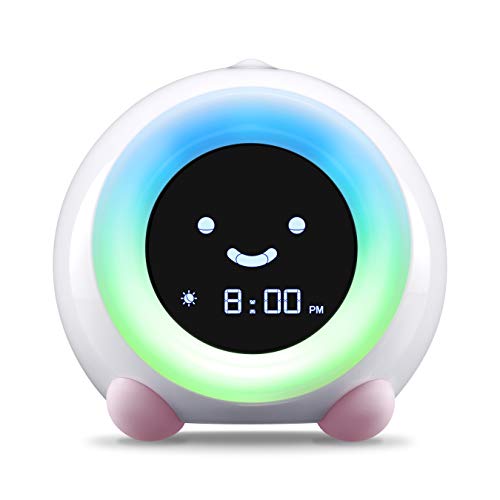I had a friend call me yesterday saying, “Help! My child will not go to bed at night and won’t wake up in the morning. What do I do?” Having faced this dilemma myself, I shared everything we have tried.
While we haven’t perfected our nighttime routine, sleep issues with kids are so important to address. I want to help be a part of your journey to solving sleep problems with your child.
My friend was grateful after we hung up the phone. She hadn’t thought or read about some of these ideas and encouraged me to write this post to help contribute to the topic of sleep solutions for kids.

Help! My Child Will Not Go to Bed at Night and Won’t Wake Up in the Morning
You are not alone in your struggle to get your children the right amount of sleep. Most kids resist bedtime. I think it’s part of their job description.
If you are like any other parent, you probably have loads of questions about sleep and children. I want to address some of these really important questions before moving on to some of my bedtime and morning routine hacks.
How Many Hours of Sleep D Kids Need?
Sleep is so incredibly important. My blogging friend from Your Modern Family recently wrote a shocking article that discussed how studies showed that “70% of those children (in the study) had been misdiagnosed with ADHD when they actually had a treatable sleep disorder.” This article is a must-read for any parent concerned about their children’s sleep and behavior habits.
According to WebMD, here is the breakdown:
- 1-4 Weeks: 15-16 hours a day
- 1-12 Months: 14-15 hours a day
- 1-3 Years: 12-14 hours a day
- 3-6 Years: 10-12 hours a day
- 7-12 Years: 10-11 hours a day
- 12-18 Years: 8-9 hours a day
Note: Web MD is one source. Because 8-9 hours for teens seemed low to me, I decided to check another source. Here is what was said at Nationwide Children’s:
“The average amount of sleep that teenagers get is between 7 and 7 ¼ hours. However, they need between 9 and 9 ½ hours (studies show that most teenagers need exactly 9 ¼ hours of sleep).”

What Time Should Kids Go to Bed at Night?
I know you probably know how to do the math, but let me make it easy for you and give you the time your kids should fall asleep at night to get the right amount of sleep at each age.
I’m going to ignore the baby and toddler years because that’s a whole different ball game with naps.
Of course, what time kids go to bed depends on what time they need to wake up. Summers will look different than the school year. I’m providing the sleep time based on a 7:00 AM wake-up for school-aged children.
Bed Times for Kids at Different Ages (assuming a 7:00 wake-up time):
- 3-6 Years: Between 7:00 PM and 9:00 PM
- 7-12 Years: Between 8:00 PM and 9:00 PM
- 12-18 Years: Between 10:00 PM and 11:00 PM (or according to Nationwide Children’s, a bit earlier – see above)
Our Story about Children and Sleep
I have also screamed, “Help! My Child Will Not Go to Bed at Night and Won’t Wake Up in the Morning”
My heart is always to be real and candid with you. It does no one any benefit to think that I have this whole parenting thing down. I don’t. I’ve been candid about why I suck at being a mom. In that post, I even admit to hating bedtime. I also have bared my soul in this post: I Have Everything I Ever Wanted. Why am I so Unhappy?
So while I confess to struggling as a mom, it doesn’t mean I haven’t come up with solutions and hacks that work for us – especially when I’m actually living out my own best advice, which is way over half the battle.
I have one kid that makes bedtime easy. I have three kids.
The other two? Well, that’s a different story. There are memories of my daughter standing in front of our bed at 11:00 at night saying, “I’m just a night out.” Her cute twist of the “night owl” phrase only entertained me a bit while she was on her 20th time out of bed.
Trust me, “Help! My child will not go to bed at night and won’t wake up in the morning. What do I do?” has been the cry of my heart so many times.
My husband and I are both wired to be night owls, so I get it. However, knowing the importance of sleep and an alarm clock that beacons the kids to school, staying up until midnight just can’t be the answer.
Our Husband and Wife Bedtime Roles
Bedtime has been a battle. Neither of us loves it.
One evening, my husband and I were talking. He said, “There was something easier back in the 50s when there were defined roles of the woman and man within the household.”
Before you jump on him for wanting to stick women back in the 50s, hear him out.
He continued, “Right now, our roles are muddled. We never know who is going to take the garbage out, who is going to put the kids to bed or who is going to do the dishes. It can become a conflict because we are both just hoping the other one does it.”
Hmmm. Good point. I responded, “Well, back then the woman just got stuck doing all of it. It’s not really fair that I would need to do the night chores that I don’t like (dishes and bedtime) while you do whatever it is you want to do.”
He quickly clarified that’s not what he was suggesting. At that moment we took time to define our evening roles. I do the dishes and take care of the kitchen. He puts the kids to bed. This was our choice.
Sometimes I feel like a “bad mom” because I don’t want to put my kids to bed. We can be really hard on ourselves for not being what we imagined, can’t we? However, when I think about it I figure that they’ve had enough of me. I’ve woken them up in the morning, fed them, been their taxi to school and sporting events, helping with homework, and enforced all the cleaning that needs to be done around here. I’ve done crafts, played games, kissed boo-boos, gone on field trips, and read books.
My husband has done loads in his day as well. He is a great father and works so hard. He is super present, and I am grateful. Giving him that time with the kids at night is a benefit to everyone. I don’t need to feel the guilt.
Bedtime Solutions that Help Kids Go to Bed
Unfortunately, with most parenting, for things to go well, we need to be on top of our game as parents. So much of the success at bedtime depends on us.
When we go into the evening with a plan and a routine, it all goes better. It’s when we get harried, have our own personal agenda, or become annoyed that things tend to fall apart.
Sticking to the following advice should greatly help your nighttime go more smoothly with your “night out” kids.
Keep a Routine
Night-time routines help kids. They know what to expect.
Keeping a consistent bedtime also helps. Let’s take our 7-12-year-old child that should theoretically be asleep by 8:00-9:00 at night. My recommendation would be to start the bedtime routine at 7:00 at night.
A 7:00 start time means that the evening get-ready-for-bed routine takes 30 minutes. Then, they have 30 minutes of chill time (explained below). Hopefully, they will fall asleep within the hour after that (ideally shorter).

I have created the “I am Responsible for Me” printable that helps kids take to know how to be responsible for their own stuff at different times of the day.
What to Take Care of at Night
If you have kids that tend to stay up later at night and have a hard time waking in the morning, my solution is to take care of EVERYTHING at night. The goal would be to have this bedtime routine done within 30 minutes.
Pack lunches at night. Here’s my post about our packing lunches resolution. My kids pack their own lunch, and it’s in the refrigerator every night before bed.
Shower in the afternoon or in the evening. Take care of all the cleaning of the body before they get into bed.
Hair should be in fairly good shape before going to bed. For girls, this can be complicated. Some kids have straight hair that can be dried in the evening and look fine in the morning.
Other girls have curly hair, and it can be a challenge. We only recently have been able to tame my daughter’s curls after years of trying. We were introduced to the book Curly Girl: The Handbook (Amazon affiliate links here and to follow), and it’s been a game changer. So many tips there, but not shampooing, using a sulfate-free conditioner, using fingers to comb, and then sleeping in a silk cap has been the solution.
Here’s the tip that is going to either make me a hero or win me the worst mom of the year award. If morning time is truly a struggle, have them sleep in their clothes. Yup, you heard me. Have them sleep in their clothes. You can start judging me now.
We have established that they are showered and clean. Why not sleep in their clothes? When kids hit those stinky pre-teen and teenage years this doesn’t work so well. However, when they are younger, they just don’t get gross at night. If you want your morning routine to take minutes, this is the solution.
If you can’t bring yourself to let them sleep in their clothes, at least make sure their outfit for the next day is all picked out and ready to go.
The rest of the responsibilities are pretty typical: brush teeth, drink water and go potty. Take care of all their needs before heading to bed.
Also, make sure they have everything they need to be packed up in their school bags and that it is ready by the door for the next morning.
Tomato Stake Them at Bedtime
What’s tomato staking? I explain it more in this post, but the main idea is to keep them close to you in the process so you can teach and keep things under control.
When we let our kids just do the routine on their own, it often quickly digresses into craziness and goofiness. If bedtime really is an issue, you want to help keep things calm, and this means being close to them.
Be there to teach them how to brush their teeth quietly. Have a presence while they are making lunches to ensure it doesn’t have 3 cookies and no fruit. Escort them to their bedrooms so that the sibling goofiness or fighting doesn’t start.
Your undivided attention will make a big difference.

Give Them 30 Minutes of Quiet Time in their Bed
To have a calm activity to quiet their brains and bodies before bed is really helpful.
Of course, I promote reading time. For little kids that are non-readers, this might be just flipping through a book. For older kids, it’s a great time to get their reading in. Don’t have one that loves to read? Allow this time for comics or try a book on tape.
You will know your kids. Sometimes a parent can read to the whole group together, and it won’t digress into kicking one another or other kinds of craziness. I think many families do better with kids in their own rooms having their own quiet time.
Parents can take turns spending one-on-one time with their kids during this quiet time.
While I love the thought of reading for those thirty minutes, other quiet activities include: listening to peaceful music, coloring, doing a puzzle book, or listening to a book on tape. I discourage any kind of screen time to wind down. Studies show that all screen time only contributes to a more active, stress-filled brain.
Stay Calm and Try and Keep a Positive Attitude
Our demeanor greatly impacts our children. I know bedtime is often filled with the cry of a parent’s heart, “Just go to bed! Please! Just go to bed!”
We often are just all done by then. Time with our spouse, quiet time, time to get a few more things done around the house – those things become the priority of our minds.
I would argue that if you can give your kids that uninterrupted and focused time right before bed, you will have a greater chance of them staying in bed. They will get their heart cups filled.
Screaming and being intense can be our natural go-to at bedtime. We are frustrated and fed up. If we just get angry, maybe they’ll get it and GO TO BED. I would argue that it only contributes to more rebellion.
We don’t always do this well or right, but I will testify that we always have greater success when we stay calm, make our expectations clear and keep the interaction positive and encouraging.
Ask for the behavior you want rather than what you don’t want.
Let them come up with bedtime solutions so that they have ownership of the goal to stay in bed and get the sleep they need.
What Happens When They Don’t Stay in Bed?
You might be wondering what consequences we have for when kids don’t stay in bed. I’m just going to quickly run through some solutions we have come up with over the years.
- Earlier Bedtime the Following Night – You kept us up for an hour last night with your shenanigans, you go to bed an hour earlier tonight.
- Grounded the Next Day – If bedtime is a hassle, the next day there is no screen time, treats, or friends.
- Things Taken Away – We have unscrewed lightbulbs, and taken away beloved stuffed animals or other items in their rooms.
- Jobs – Give them jobs around the house to make up for the time wasted the night before. Here’s a chore list with appropriate job ideas for different ages.
Morning Solutions that Help Mornings Run Smoother
If you have done everything in the night routine, the morning routine should only take a matter of minutes. Preparing the night before is the key if you have a child who is hard to wake up in the morning.
Just a reminder, at night you already have their lunches packed, and their backpacks ready and you may have even followed my advice to have them sleep in their clothes.
If that’s the case, the morning routine is simple. Eat breakfast. Brush teeth. Take care of hair (minimal since the shower and hair prep was done in the evening as suggested earlier). These things should take no time at all.
Morning Wake-Up Hack
I have a technology-driven morning hack. I’ve already shared my morning hack if you have kids getting up too early. Now I’m addressing having kids that have a hard time waking up.
I live in the Pacific NW, which means during the school year it is often dark in the morning. The sun breaking through the windows to provide a gradual wake up, just doesn’t happen naturally.
My husband recently decided to install a Lutron Smart Home Switch (Amazon affiliate link) in the kids’ bedroom. The reason we installed the switch is just to help ensure lights are turned off when they are supposed to be turned off.
However, I have recently used this technology to my benefit in the morning.
The Lutron smart home switch is tied into an app on my phone. The app schedules the lights coming on. Initially, I turn the kids’ lights to 10%. After 5-10 minutes, I turn their lights up to 20%. I might do one more notch again or go up to get them.
Another technology I recently learned about is the Phillips wake-up light alarm clock (affiliate). My husband is asking for one for Christmas.
Here’s what Phillips says about their light, “Featuring a colored sunrise simulation and 20 brightness settings, the light gradually increases between 20 to 40 minutes prior to your alarm time. The light also offers the option of waking up to one of five different nature-inspired sounds. Backed by clinical research, the UV-free Wake-Up Light is proven to wake you up with an improved mood and energy level. A light-responsive dimming feature guides you to natural, restful sleep.”
In doing this light simulation, I have found the kids will often just get out of bed themselves without me needing to go wake them up. This gradual light coming on has greatly reduced the amount of time it takes them to get out of bed in the morning.
I have a sensory child who gets headaches. Gradually turning the lights on for her has helped reduce the sensory overload that can often lead to morning headaches that continue throughout the day.
Lutron Smart Home Switch has been one of those unexpected parenting hacks that have contributed to the success of both our bedtime and our morning routine.
Philips Wake-Up Light Alarm ClockLutron Caseta Smart Home Plug-inLutron Caseta Smart Start Kit,LittleHippo Mella Ready to Rise
Now when you are screaming, “Help! My Child Will Not Go to Bed at Night and Won’t Wake Up in the Morning,” you have some parenting hacks to help along the way.
Sweet dreams. Stay in bed, kids!









